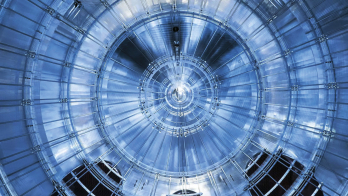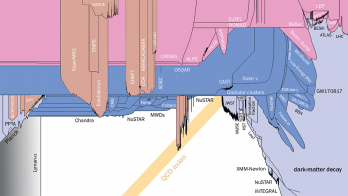
From 25 to 28 May, the long-lived particle (LLP) community marked five years of stretching the limits of searches for new physics with its ninth and best-attended workshop yet, with more than 300 registered participants.
LLP9 played host to six new results, three each from ATLAS and CMS. These included a remarkable new ATLAS paper searching for stopped particles – beyond-the-Standard Model (BSM) LLPs that can be produced in a proton–proton collision and then get stuck in the detector before decaying minutes, days or weeks later. Good hypothetical examples are the so-called gluino R-hadrons that occur in supersymmetric models. Also featured was a new CMS search for displaced di-muon resonances using “data scouting” – a unique method of increasing the number of potential signal events kept at the trigger level by reducing the event information that is retained. Both experiments presented new results searching for the Higgs boson decaying to LLPs (see “LLP candidate” figure).
Long-lived particles can also be produced in a collision inside ATLAS, CMS or LHCb and live long enough to drift entirely outside of the detector volume. To ensure that this discovery avenue is also covered for the future of the LHC’s operation, there is a rich set of dedicated LLP detectors either approved or proposed, and LLP9 featured updates from MoEDAL, FASER, MATHUSLA, CODEX-b, MilliQan, FACET and SND@LHC, as well as a presentation about the proposed forward physics facility for the High-Luminosity LHC (HL-LHC).
Reinterpreting machine learning
The liveliest parts of any LLP community workshop are the brainstorming and hands-on working-group sessions. LLP9 included multiple vibrant discussions and working sessions, including on heavy neutral leptons and the ability of physicists who are not members of experimental collaborations to be able to re-interpret LLP searches – a key issue for the LLP community. At LLP9, participants examined the challenges inherent in re-interpreting LLP results that use machine learning techniques, by now a common feature of particle-physics analyses. For example, boosted decision trees (BDTs) and neural networks (NNs) can be quite powerful for either object identification or event-level discrimination in LLP searches, but it’s not entirely clear how best to give theorists access to the full original BDT or NN used internally by the experiments.
LLP searches at the LHC often must also grapple with background sources that are negligible for the majority of searches for prompt objects. These backgrounds – such as cosmic muons, beam-induced backgrounds, beam-halo effects and cavern backgrounds – are reasonably well-understood for Run 2 and Run 3, but little study has been performed for the upcoming HL-LHC, and LLP9 featured a brainstorming session about what such non-standard backgrounds might look like in the future.
Also looking to the future, two very forward-thinking working-group sessions were held on LLPs at a potential future muon collider and at the proposed Future Circular Collider (FCC). Hadron collisions at ~100 TeV in FCC-hh would open up completely unprecedented discovery potential, including for LLPs, but it’s unclear how to optimise detector designs for both LLPs and the full slate of prompt searches.
Simulating dark showers is a longstanding challenge
Finally, LLP9 hosted an in-depth working-group session dedicated to the simulation of “dark showers”, in collaboration with the organisers of the dark-showers study group connected to the Snowmass process, which is currently shaping the future of US particle physics. Dark showers are a generic and poorly understood feature of a potential BSM dark sector with similarities to QCD, which could have its own “dark hadronisation” rules. Simulating dark showers is a longstanding challenge. More than 50 participants joined for a hands-on demonstration of simulation tools and a discussion of the dark-showers Pythia module, highlighting the growing interest in this subject in the LLP community.
LLP9 was raucous and stimulating, and identified multiple new avenues of research. LLPX, the tenth workshop in the series, will be held in November this year.







